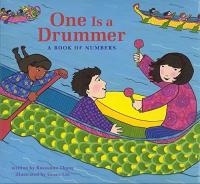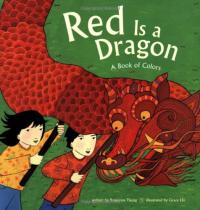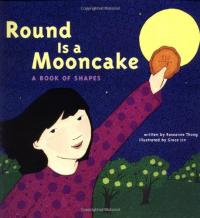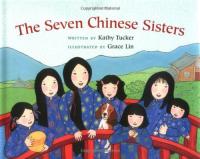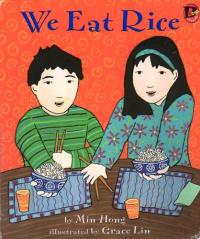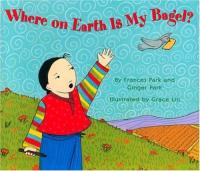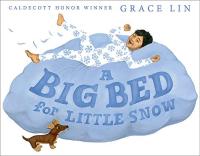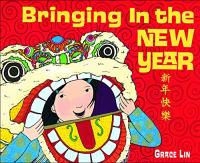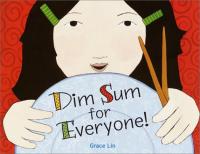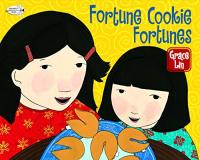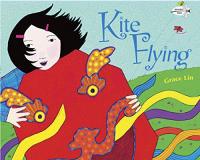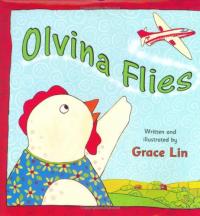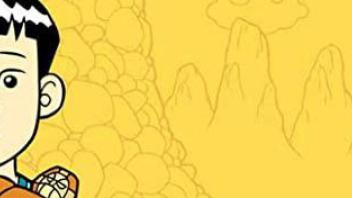So, this book is my new Newbery Honor book, Where the Mountain Meets the Moon. A lot of people are calling it a Chinese Wizard of Oz. Which I think is really interesting. And it’s a really great way to explain to people, but I do want people to know that, that I actually very, very loosely took the idea of this book from a book. A Chinese book called Olive Lake. I’ve changed it quite a bit so you could call The Wizard of Oz, an American version of a Chinese tale of Olive Lake.
So but regardless this book is called Where the Mountain Meets the Moon. And it’s about this girl Min Lee who goes on this great journey and she’s on her way to meet the old man of the moon. And as she goes on this journey she meets all of these different people and all of these different creatures. And each one of them tells her a different story. And each story she hears affects her journey. Even though she doesn’t know it affects her journey until the very end, it affects, in a very deep and profound way.
And hopefully the reader too. So the story, this is one of the story she hears. This is the story of the old man in the moon. This is where her father tells her and I’ll read it now.
This is the story of the old man in the moon. “Once there was a magistrate who was quite powerful and proud. He was so proud he demanded constant respect from his people. Whenever he made a trip out of the city no matter time of day or night, people were to leave their homes get on their knees and make deep bows as he passed or else face the brutal punishment of his soldiers.
The magistrate was fierce in his anger as well as his pride. It is said he even expected the monkeys to come down from the trees to bow to him. The magistrate was his harsh to his subordinates, ruthless to his enemies, and pitiless to his people. All feared his wrath. And when he roared orders, people trembled. Behind his back, they called him Magistrate Tiger.
Tiger’s most coveted wish was to be of royal blood. As soon as his son was born he began to make trips and inquiries to gain influence in hopes he could marry his son to a member of the imperial family. One night as the magistrate traveled through to the mountains again on a trip to gain favor for his son’s future marriage he saw an old man sitting alone in the moonlight.
The old man ignored the passing horses and the carriages. The silk brocade and the government seal, and simply continued reading a large book in his lap. The old man, infuriated Magistrate Tiger and he ordered the carriage to stop.
However even the halting noises did not make the old man look up. Finally Magistrate Tiger exited his carriage and went to the old man who was still engrossed in his book. “Do you not bow to your magistrate?” he roared. The old man continued to read. “What are you reading that is so important?” the magistrate demanded and looked at the pages of the book. It was full scribbles and scrawls not of any language the magistrate knew of.
“Why it’s just nonsense written in there!”, “Nonsense?”, the old man said. Finally, looking up. “You fool, this is the book of fortune. It holds all the knowledge of the world that past, the present, and the future.” The magistrate looked again at the marks of the page. “I cannot read it”, he said. “Of course not”, the man said. “But I the old man in the moon guardian of the book of fortune can read it. And with it I can answer any question in the world.”
“You can answer any question in the world?”, the magistrate scoffed. “Very well. Who am I son marry when he is of age?” The old man in the moon flipped the pages of the book, “Hmm” he said to himself. “Yes here it is. Your son’s future wife is now two year old daughter of a grocer in the next village.” “The daughter of a grocer?” the magistrate spat.
“Yes”, the old man in the moon continued. “Right now she is wrapped in a blue blanket embroidered with white rabbits. Sitting on the lap of her blind grandmother in front of her house.” “No! I won’t allow it.”, the magistrate said. “It’s true”, the old man said.
“They are destined to be husband and wife. I myself tied the red cord that binds them.” “What red cord?”, magistrate Tiger demanded. “Do you know nothing? I tied together everyone who needs with these red threads.”, the old man sighed holding up his bag of red strings. “When you were born I tied your ankles to your wife’s ankles with a red thread. And as you both grew older the line became shorter and shorter. Until you eventually met.”
“All the people you’ve met in your life have been brought to you by the red cords I tied. I must have forgotten to cut the end of one of those lines which is why you are meeting me now. I won’t do that again.”
“I don’t believe you”, the magistrate said. “Believe or don’t believe”, the old man said standing up putting the big book on his back. “We’ve reached the end of our thread and I will now leave.” The magistrate stared in dumbfounded silence as the old man in the moon walked up the mountain. “Crazy old man.”, the magistrate said finally.
“What a waste of my time.” The magistrate returned to his carriage and continued on. As they drove to the next village he saw an old blind woman holding a baby girl in front of a house. The girl is wrapped in blue blanket embroidered with white rabbits just as the old man in the moon had said. Magistrate Tiger burned with anger, “I will not let my son marry a grocer’s daughter”, he vowed. So after he arrived at his guest house, the magistrate secretly ordered one of his servant’s to return to the grocer’s home and stab the girl with a knife.
“That will take care of her.”, he thought to himself. Many years later Magistrate Tiger had his dreamed fulfilled. He was finally able to obtain a match for his son with one of the emperor’s many granddaughters. And his son would inherit the rule of a remote city. On the wedding day, Magistrate Tiger bragged to his son about how he arranged the marriage and outwitted the old man in the moon.
The son, who was not like his father, said nothing. But after the wedding ceremonies sent a trusted servant to find the grocer’s family to make amends. In the meantime he became acquainted with his bride and was happy to find both were pleased with each other. He found his new wife beautiful. The only oddity about her being that she always wore a delicate flower on her forehead.
“Dear wife”, he said, “Why do you always wear that flower? Even to sleep you never remove it.” “It is to hide my scar” she said touching her forehead in embarrassment. “When I was a child no older than two, a strange man stabbed me with a knife. I survived, but I still have this scar.” And at that moment the trusted servant came rushing in, “Master! I made the inquiries you asked for and found that many years ago the grocer’s family perished, except for the daughter.
The king of the city, the emperor’s ninth son, had adopted a daughter and raised her as his own. And that daughter is your wife!”
And that’s the end of that part of that story.

